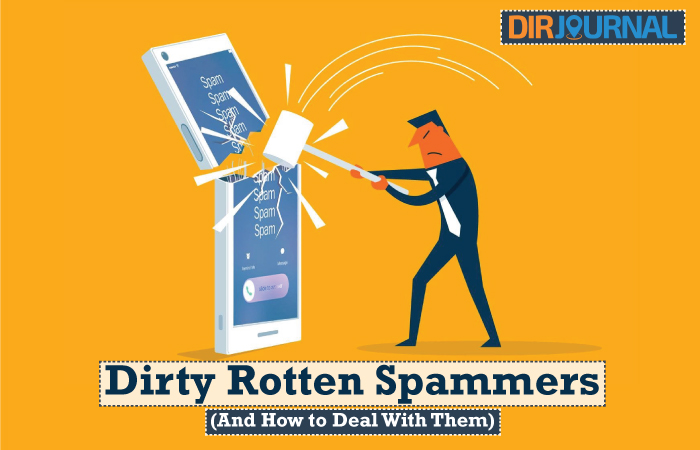Spam can be seriously annoying. I recently moved my business email accounts to a new host where my former spam settings obviously were reset. And wow, was I ever astonished by how much spam came through! It’s amazing to think about how much our spam filters actually catch and keep away from us, because it’s easier to focus on the ones that still slip through the cracks.
Let’s talk about those spammers who still manage to reach our inboxes today with a few tips on how you can deal with spam and avoid more of it in the first place.

Deal With Spammers in 3 Easy Steps
- Blacklist the sender. You can do this through your ISP, email host, or email client. Blacklist the whole domain if it’s for a spam site.
- Report persistent spammers to their ISP. For example, if the spam comes from a Gmail address, report it to Google. Unfortunately addresses can be faked, so this won’t always work, but it’s worth a shot. If you’re in the U.S. you can also forward spam to the Federal Trade Commission (FTC) — forward it to spam@uce.gov.
- Most importantly, never respond. Responding to spam just lets the spammer know that the account is actually monitored. It tells them they’re reaching a real person, and that could encourage more spam rather than less.
Prevent More Spam in the First Place

One of the best ways to deal with spam is to prevent it in the first place. Of course one option is to never share your primary email address (some people use a separate “junk” email account for site registrations and email newsletters for example). But for businesses that’s often not an option — prospects need to know how to reach you. In that case, consider adding an email contact form to your website instead of an email address, and use Captcha to weed out automated spam.
You should also check your spam filters. If too much is getting through, take it up a notch. You could even go so far as to ask your ISP to allow only whitelisted addresses to get through (only friends and family you add to a list for example, so you have to pre-approve email senders similar to accepting a social media “friendship” before a person can message you there).
Another idea is to host your own email address (such as through your own website or blog) so you aren’t using a common generic extension like “gmail.com.” If spammers search for and harvest email by searching for these common extensions, they won’t find yours there.
I have yet to find a perfect solution for weeding out spam. Even with a whitelist-only option there’s always the chance an approved sender will be hacked and you’ll be auto-spammed (I know quite a lot of people who have had AOL email address hacked in recent years for example). Just be aware of your options. And whatever you do, don’t encourage the spammers by responding or you might never be rid of them.








[…] This post was mentioned on Twitter by Blair Wolf, DIRJournal.com. DIRJournal.com said: Dirty Rotten Spammers (And How to Deal With Them) http://bit.ly/bx7bUQ […]
You’re not the average blog writer, man. You definitely have something important to contribute to the net.
The story was good.
Great information shared..I am very happy to read this site..appreciate for giving us nice info.Fantastic walk-through. I appreciate this website.
I found a satisfying way to get them back.
I copy their name and email address and post it every where I can. Now they know how I feel.
Write back if you agree!
Susan
suz72ehs@yahoo.com
That’s a pretty bad idea for a few reasons:
1. It may violate privacy laws where you live to post their contact info without permission.
2. It wastes an awful lot of your time to do that “everywhere you can.”
3. It will have little to no impact on them. Many spammers use fake names so there won’t be much damage to their reputation. And email addresses are extremely easy to replace. Spammers usually use throwaway ones through free providers anyway. And if they host their own, it can take a matter of seconds for them to eliminate it and set up a new one on the server. So they continue spamming, and they never get the hate mail or spam you may hope they get by publishing the info.
I wouldn’t waste my time. The other suggestions are more likely to get results, even if it just means preventing it in the future.